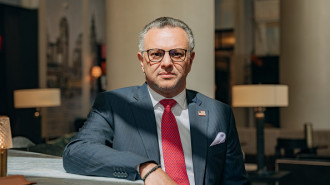Detained Egyptian journalist's health seriously deteriorating, says HRW
Monitoring group Human Rights Watch called upon Egypt's government to provide necessary care to imprisoned journalist Hisham Gaafar, whose health is said to be deteriorating.
Gaafar, who is director of the Mada Foundation for Media Development, was arrested in 2015 and detained pending an investigation into alleged membership of the Muslim Brotherhood and receiving illegal funding for his private foundation.
"Egypt's interior ministry has shown contempt for Hisham Gaafar's health and well-being," said Sarah Leah Whitson, Middle East director at Human Rights Watch. "The fact that the interior ministry refuses to provide him his rightful care is a sad testament to Egyptian authorities' disregard for detainees' most basic rights."
Gaafar, 53, suffers from an eye condition - optic nerve atrophy - meaning that without adequate care he may lose his eyesight altogether. He also suffers from a prostate enlargement condition which could also be exacerbated without proper medical care.
According to Gaafar's family, his health is already deteriorating and his eye-sight has weakened as a result of neglect by authorities.
His wife reported after a visit in March 2017 that her husband had lost significant weight and had bite marks around his body. The marks are believed to have been from insects that infested Gaafar's cell after a sewage leak.
After the March visit, prison authorities began denying visits from relatives or his lawyer.
Gaafar's wife alleges that her husband was kept in a dark cell and only intermittently given medication for his eyes. She also says that a pair of glasses that she sent her husband appeared to have been deliberately smashed by prison authorities.
During his time in prison, Gaafar has also suffered from other problems, including reporting passing blood in his urine.
Gaafar is currently being held under laws that allow Egypt's judiciary to detain individuals suspected of serious crimes for up to two years without substantive justification.
HRW has slammed the Egyptian judiciary's role in Gaafar's detention and called it "complicit in human rights violations".
If found guilty of receiving illegal foreign funds, Gaafar could face up to 25 years in prison.

![Palestinians mourned the victims of an Israeli strike on Deir al-Balah [Getty]](/sites/default/files/styles/image_684x385/public/2024-11/GettyImages-2182362043.jpg?h=199d8c1f&itok=xSHZFbmc)


![The law could be enforced against teachers without prior notice [Getty]](/sites/default/files/styles/image_684x385/public/2178740715.jpeg?h=a5f2f23a&itok=hnqrCS4x)
 Follow the Middle East's top stories in English at The New Arab on Google News
Follow the Middle East's top stories in English at The New Arab on Google News


